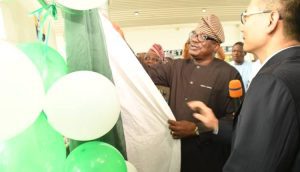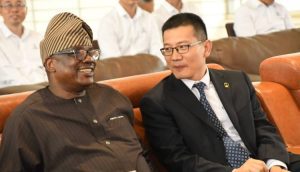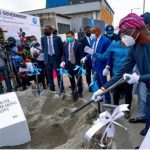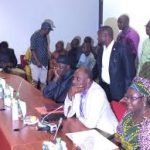The Nigerian Federal Capital Territory Administration (FCTA) has flagged off the renovation of the Abuja Rail Mass Transit (ARMT) System to help alleviate the territory’s transportation challenges.
The FCT Permanent Secretary,Mr. Olusade Adesola, stated during the exercise’s launch that the goal was to rebuild the crucial transportation infrastructure, which he described as the “life blood of Abuja city.”

The project would be completed in 12 months by China Civil Engineering Construction Corporation Ltd (CCECC) at a cost of five billion naira.
The Abuja light rail system, according to the permanent secretary, will be critical in reducing transportation difficulties and increasing mobility for citizens.
He added that the COVID-19 pandemic demanded the temporary shutdown of the rail system as part of the virus’s control procedures.
Sadly, he continued, hoodlums vandalised vital train system equipment during the period of inaction, describing the episode as a “serious setback.”
Contracts for providing security for the ARMT System, according to the permanent secretary, have been awarded.

He explained that the rehabilitation would involve the repair and replacement of damaged equipment, upgrading of facilities, and implementing modern security measures to protect against future threats.
He assured residents that the process would be expedited without compromising on quality, and “we will soon witness the return of a more efficient and reliable transportation system.
Mr. Joseph Akinteye, FCTA’s Director of Transportation, stated that the ARMT system rehabilitation project, consisting of Lots 1 A and 3, spanning 45.245 kilometers (km), will cost five billion naira.
According to Akinteye, the ARMT system phase 1 was granted in 2007, and it consists of Lots 1 and 3, totaling 77.775 km out of the six Lots authorized by the Transportation Master plan.

He added that the ripple impacts would be an immense relief to the present unpleasant effects of the fuel subsidy removal on Nigerians and especially the FCT residents.
The Managing Director, CCECC, Mr. Wang Xixue, said that the successful commencement of rehabilitation of the vandalised components of the ARMT system was critical to the development of the transportation system in the FCTA.
He stated that rehabilitation, which was projected to take 12 months, will be completed as quickly as possible.
He stated that the project will include the restoration of vandalized components of Lot 1A and Lot 3, the removal of impediments, and the resumption of commercial functioning of the ARMT system.
The Nigerian Federal Capital Territory Administration (FCTA) has flagged off the renovation of the Abuja Rail Mass Transit (ARMT) System to help alleviate the territory’s transportation challenges.
The FCT Permanent Secretary,Mr. Olusade Adesola, stated during the exercise’s launch that the goal was to rebuild the crucial transportation infrastructure, which he described as the “life blood of Abuja city.”

The project would be completed in 12 months by China Civil Engineering Construction Corporation Ltd (CCECC) at a cost of five billion naira.
The Abuja light rail system, according to the permanent secretary, will be critical in reducing transportation difficulties and increasing mobility for citizens.
He added that the COVID-19 pandemic demanded the temporary shutdown of the rail system as part of the virus’s control procedures.
Sadly, he continued, hoodlums vandalised vital train system equipment during the period of inaction, describing the episode as a “serious setback.”
Contracts for providing security for the ARMT System, according to the permanent secretary, have been awarded.

He explained that the rehabilitation would involve the repair and replacement of damaged equipment, upgrading of facilities, and implementing modern security measures to protect against future threats.
He assured residents that the process would be expedited without compromising on quality, and “we will soon witness the return of a more efficient and reliable transportation system.
Mr. Joseph Akinteye, FCTA’s Director of Transportation, stated that the ARMT system rehabilitation project, consisting of Lots 1 A and 3, spanning 45.245 kilometers (km), will cost five billion naira.
According to Akinteye, the ARMT system phase 1 was granted in 2007, and it consists of Lots 1 and 3, totaling 77.775 km out of the six Lots authorized by the Transportation Master plan.

He added that the ripple impacts would be an immense relief to the present unpleasant effects of the fuel subsidy removal on Nigerians and especially the FCT residents.
The Managing Director, CCECC, Mr. Wang Xixue, said that the successful commencement of rehabilitation of the vandalised components of the ARMT system was critical to the development of the transportation system in the FCTA.
He stated that rehabilitation, which was projected to take 12 months, will be completed as quickly as possible.
He stated that the project will include the restoration of vandalized components of Lot 1A and Lot 3, the removal of impediments, and the resumption of commercial functioning of the ARMT system.
The Nigerian Federal Capital Territory Administration (FCTA) has flagged off the renovation of the Abuja Rail Mass Transit (ARMT) System to help alleviate the territory’s transportation challenges.
The FCT Permanent Secretary,Mr. Olusade Adesola, stated during the exercise’s launch that the goal was to rebuild the crucial transportation infrastructure, which he described as the “life blood of Abuja city.”

The project would be completed in 12 months by China Civil Engineering Construction Corporation Ltd (CCECC) at a cost of five billion naira.
The Abuja light rail system, according to the permanent secretary, will be critical in reducing transportation difficulties and increasing mobility for citizens.
He added that the COVID-19 pandemic demanded the temporary shutdown of the rail system as part of the virus’s control procedures.
Sadly, he continued, hoodlums vandalised vital train system equipment during the period of inaction, describing the episode as a “serious setback.”
Contracts for providing security for the ARMT System, according to the permanent secretary, have been awarded.

He explained that the rehabilitation would involve the repair and replacement of damaged equipment, upgrading of facilities, and implementing modern security measures to protect against future threats.
He assured residents that the process would be expedited without compromising on quality, and “we will soon witness the return of a more efficient and reliable transportation system.
Mr. Joseph Akinteye, FCTA’s Director of Transportation, stated that the ARMT system rehabilitation project, consisting of Lots 1 A and 3, spanning 45.245 kilometers (km), will cost five billion naira.
According to Akinteye, the ARMT system phase 1 was granted in 2007, and it consists of Lots 1 and 3, totaling 77.775 km out of the six Lots authorized by the Transportation Master plan.

He added that the ripple impacts would be an immense relief to the present unpleasant effects of the fuel subsidy removal on Nigerians and especially the FCT residents.
The Managing Director, CCECC, Mr. Wang Xixue, said that the successful commencement of rehabilitation of the vandalised components of the ARMT system was critical to the development of the transportation system in the FCTA.
He stated that rehabilitation, which was projected to take 12 months, will be completed as quickly as possible.
He stated that the project will include the restoration of vandalized components of Lot 1A and Lot 3, the removal of impediments, and the resumption of commercial functioning of the ARMT system.
The Nigerian Federal Capital Territory Administration (FCTA) has flagged off the renovation of the Abuja Rail Mass Transit (ARMT) System to help alleviate the territory’s transportation challenges.
The FCT Permanent Secretary,Mr. Olusade Adesola, stated during the exercise’s launch that the goal was to rebuild the crucial transportation infrastructure, which he described as the “life blood of Abuja city.”

The project would be completed in 12 months by China Civil Engineering Construction Corporation Ltd (CCECC) at a cost of five billion naira.
The Abuja light rail system, according to the permanent secretary, will be critical in reducing transportation difficulties and increasing mobility for citizens.
He added that the COVID-19 pandemic demanded the temporary shutdown of the rail system as part of the virus’s control procedures.
Sadly, he continued, hoodlums vandalised vital train system equipment during the period of inaction, describing the episode as a “serious setback.”
Contracts for providing security for the ARMT System, according to the permanent secretary, have been awarded.

He explained that the rehabilitation would involve the repair and replacement of damaged equipment, upgrading of facilities, and implementing modern security measures to protect against future threats.
He assured residents that the process would be expedited without compromising on quality, and “we will soon witness the return of a more efficient and reliable transportation system.
Mr. Joseph Akinteye, FCTA’s Director of Transportation, stated that the ARMT system rehabilitation project, consisting of Lots 1 A and 3, spanning 45.245 kilometers (km), will cost five billion naira.
According to Akinteye, the ARMT system phase 1 was granted in 2007, and it consists of Lots 1 and 3, totaling 77.775 km out of the six Lots authorized by the Transportation Master plan.

He added that the ripple impacts would be an immense relief to the present unpleasant effects of the fuel subsidy removal on Nigerians and especially the FCT residents.
The Managing Director, CCECC, Mr. Wang Xixue, said that the successful commencement of rehabilitation of the vandalised components of the ARMT system was critical to the development of the transportation system in the FCTA.
He stated that rehabilitation, which was projected to take 12 months, will be completed as quickly as possible.
He stated that the project will include the restoration of vandalized components of Lot 1A and Lot 3, the removal of impediments, and the resumption of commercial functioning of the ARMT system.
The Nigerian Federal Capital Territory Administration (FCTA) has flagged off the renovation of the Abuja Rail Mass Transit (ARMT) System to help alleviate the territory’s transportation challenges.
The FCT Permanent Secretary,Mr. Olusade Adesola, stated during the exercise’s launch that the goal was to rebuild the crucial transportation infrastructure, which he described as the “life blood of Abuja city.”

The project would be completed in 12 months by China Civil Engineering Construction Corporation Ltd (CCECC) at a cost of five billion naira.
The Abuja light rail system, according to the permanent secretary, will be critical in reducing transportation difficulties and increasing mobility for citizens.
He added that the COVID-19 pandemic demanded the temporary shutdown of the rail system as part of the virus’s control procedures.
Sadly, he continued, hoodlums vandalised vital train system equipment during the period of inaction, describing the episode as a “serious setback.”
Contracts for providing security for the ARMT System, according to the permanent secretary, have been awarded.

He explained that the rehabilitation would involve the repair and replacement of damaged equipment, upgrading of facilities, and implementing modern security measures to protect against future threats.
He assured residents that the process would be expedited without compromising on quality, and “we will soon witness the return of a more efficient and reliable transportation system.
Mr. Joseph Akinteye, FCTA’s Director of Transportation, stated that the ARMT system rehabilitation project, consisting of Lots 1 A and 3, spanning 45.245 kilometers (km), will cost five billion naira.
According to Akinteye, the ARMT system phase 1 was granted in 2007, and it consists of Lots 1 and 3, totaling 77.775 km out of the six Lots authorized by the Transportation Master plan.

He added that the ripple impacts would be an immense relief to the present unpleasant effects of the fuel subsidy removal on Nigerians and especially the FCT residents.
The Managing Director, CCECC, Mr. Wang Xixue, said that the successful commencement of rehabilitation of the vandalised components of the ARMT system was critical to the development of the transportation system in the FCTA.
He stated that rehabilitation, which was projected to take 12 months, will be completed as quickly as possible.
He stated that the project will include the restoration of vandalized components of Lot 1A and Lot 3, the removal of impediments, and the resumption of commercial functioning of the ARMT system.
The Nigerian Federal Capital Territory Administration (FCTA) has flagged off the renovation of the Abuja Rail Mass Transit (ARMT) System to help alleviate the territory’s transportation challenges.
The FCT Permanent Secretary,Mr. Olusade Adesola, stated during the exercise’s launch that the goal was to rebuild the crucial transportation infrastructure, which he described as the “life blood of Abuja city.”

The project would be completed in 12 months by China Civil Engineering Construction Corporation Ltd (CCECC) at a cost of five billion naira.
The Abuja light rail system, according to the permanent secretary, will be critical in reducing transportation difficulties and increasing mobility for citizens.
He added that the COVID-19 pandemic demanded the temporary shutdown of the rail system as part of the virus’s control procedures.
Sadly, he continued, hoodlums vandalised vital train system equipment during the period of inaction, describing the episode as a “serious setback.”
Contracts for providing security for the ARMT System, according to the permanent secretary, have been awarded.

He explained that the rehabilitation would involve the repair and replacement of damaged equipment, upgrading of facilities, and implementing modern security measures to protect against future threats.
He assured residents that the process would be expedited without compromising on quality, and “we will soon witness the return of a more efficient and reliable transportation system.
Mr. Joseph Akinteye, FCTA’s Director of Transportation, stated that the ARMT system rehabilitation project, consisting of Lots 1 A and 3, spanning 45.245 kilometers (km), will cost five billion naira.
According to Akinteye, the ARMT system phase 1 was granted in 2007, and it consists of Lots 1 and 3, totaling 77.775 km out of the six Lots authorized by the Transportation Master plan.

He added that the ripple impacts would be an immense relief to the present unpleasant effects of the fuel subsidy removal on Nigerians and especially the FCT residents.
The Managing Director, CCECC, Mr. Wang Xixue, said that the successful commencement of rehabilitation of the vandalised components of the ARMT system was critical to the development of the transportation system in the FCTA.
He stated that rehabilitation, which was projected to take 12 months, will be completed as quickly as possible.
He stated that the project will include the restoration of vandalized components of Lot 1A and Lot 3, the removal of impediments, and the resumption of commercial functioning of the ARMT system.
The Nigerian Federal Capital Territory Administration (FCTA) has flagged off the renovation of the Abuja Rail Mass Transit (ARMT) System to help alleviate the territory’s transportation challenges.
The FCT Permanent Secretary,Mr. Olusade Adesola, stated during the exercise’s launch that the goal was to rebuild the crucial transportation infrastructure, which he described as the “life blood of Abuja city.”

The project would be completed in 12 months by China Civil Engineering Construction Corporation Ltd (CCECC) at a cost of five billion naira.
The Abuja light rail system, according to the permanent secretary, will be critical in reducing transportation difficulties and increasing mobility for citizens.
He added that the COVID-19 pandemic demanded the temporary shutdown of the rail system as part of the virus’s control procedures.
Sadly, he continued, hoodlums vandalised vital train system equipment during the period of inaction, describing the episode as a “serious setback.”
Contracts for providing security for the ARMT System, according to the permanent secretary, have been awarded.

He explained that the rehabilitation would involve the repair and replacement of damaged equipment, upgrading of facilities, and implementing modern security measures to protect against future threats.
He assured residents that the process would be expedited without compromising on quality, and “we will soon witness the return of a more efficient and reliable transportation system.
Mr. Joseph Akinteye, FCTA’s Director of Transportation, stated that the ARMT system rehabilitation project, consisting of Lots 1 A and 3, spanning 45.245 kilometers (km), will cost five billion naira.
According to Akinteye, the ARMT system phase 1 was granted in 2007, and it consists of Lots 1 and 3, totaling 77.775 km out of the six Lots authorized by the Transportation Master plan.

He added that the ripple impacts would be an immense relief to the present unpleasant effects of the fuel subsidy removal on Nigerians and especially the FCT residents.
The Managing Director, CCECC, Mr. Wang Xixue, said that the successful commencement of rehabilitation of the vandalised components of the ARMT system was critical to the development of the transportation system in the FCTA.
He stated that rehabilitation, which was projected to take 12 months, will be completed as quickly as possible.
He stated that the project will include the restoration of vandalized components of Lot 1A and Lot 3, the removal of impediments, and the resumption of commercial functioning of the ARMT system.
The Nigerian Federal Capital Territory Administration (FCTA) has flagged off the renovation of the Abuja Rail Mass Transit (ARMT) System to help alleviate the territory’s transportation challenges.
The FCT Permanent Secretary,Mr. Olusade Adesola, stated during the exercise’s launch that the goal was to rebuild the crucial transportation infrastructure, which he described as the “life blood of Abuja city.”

The project would be completed in 12 months by China Civil Engineering Construction Corporation Ltd (CCECC) at a cost of five billion naira.
The Abuja light rail system, according to the permanent secretary, will be critical in reducing transportation difficulties and increasing mobility for citizens.
He added that the COVID-19 pandemic demanded the temporary shutdown of the rail system as part of the virus’s control procedures.
Sadly, he continued, hoodlums vandalised vital train system equipment during the period of inaction, describing the episode as a “serious setback.”
Contracts for providing security for the ARMT System, according to the permanent secretary, have been awarded.

He explained that the rehabilitation would involve the repair and replacement of damaged equipment, upgrading of facilities, and implementing modern security measures to protect against future threats.
He assured residents that the process would be expedited without compromising on quality, and “we will soon witness the return of a more efficient and reliable transportation system.
Mr. Joseph Akinteye, FCTA’s Director of Transportation, stated that the ARMT system rehabilitation project, consisting of Lots 1 A and 3, spanning 45.245 kilometers (km), will cost five billion naira.
According to Akinteye, the ARMT system phase 1 was granted in 2007, and it consists of Lots 1 and 3, totaling 77.775 km out of the six Lots authorized by the Transportation Master plan.

He added that the ripple impacts would be an immense relief to the present unpleasant effects of the fuel subsidy removal on Nigerians and especially the FCT residents.
The Managing Director, CCECC, Mr. Wang Xixue, said that the successful commencement of rehabilitation of the vandalised components of the ARMT system was critical to the development of the transportation system in the FCTA.
He stated that rehabilitation, which was projected to take 12 months, will be completed as quickly as possible.
He stated that the project will include the restoration of vandalized components of Lot 1A and Lot 3, the removal of impediments, and the resumption of commercial functioning of the ARMT system.














